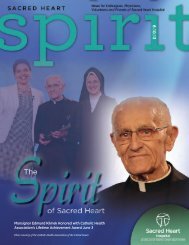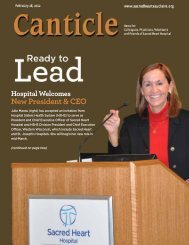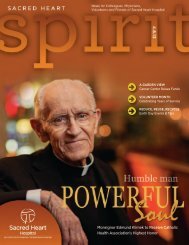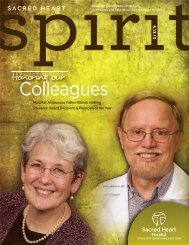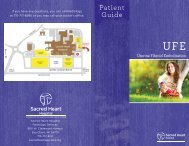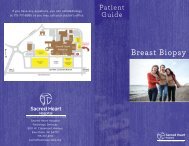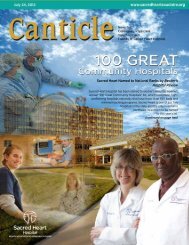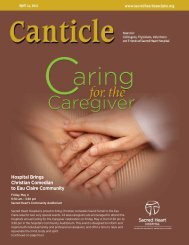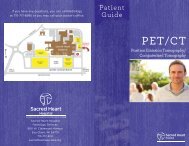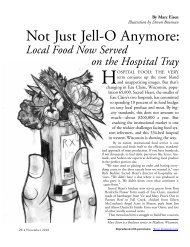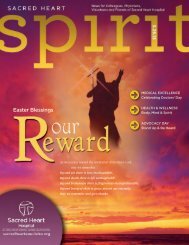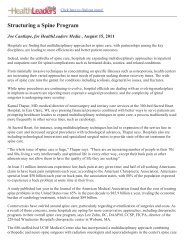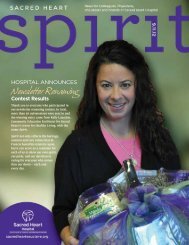Power of Attorney for Health Care - Sacred Heart Hospital
Power of Attorney for Health Care - Sacred Heart Hospital
Power of Attorney for Health Care - Sacred Heart Hospital
You also want an ePaper? Increase the reach of your titles
YUMPU automatically turns print PDFs into web optimized ePapers that Google loves.
Mick’s Story<br />
Mick was a strong, healthy 44 year old<br />
man who was badly injured in a car<br />
accident. He was taken to the hospital<br />
and placed on a ventilator. Mick was not<br />
awake to tell the doctors what he wanted,<br />
but his family physician had a copy <strong>of</strong><br />
Mick’s POA-HC that named his brother<br />
as an agent. This gave the brother<br />
permission to make medical decisions on<br />
Mick’s behalf. The brother was able to<br />
direct care until Mick was back to<br />
thinking clearly and telling the doctors<br />
what he wanted.<br />
Rosie’s Story<br />
Rosie was 82 years old and had one<br />
relative, a niece. Rosie fell one day and<br />
hit her head. She was taken to the<br />
hospital but was not able to tell the<br />
doctors what she wanted <strong>for</strong> medical<br />
care. The niece, as the closest relative,<br />
was able to direct the care in the<br />
hospital. When Rosie was ready to<br />
leave the hospital, she needed total<br />
nursing care but did not have a POA-<br />
HC that would have given her niece<br />
permission to arrange <strong>for</strong> admission to a<br />
nursing home. Rosie’s niece had to pay<br />
a fee and seek guardianship through the<br />
court in order to do this.<br />
Medical decisions may be complex,<br />
emotionally difficult, and spiritually<br />
challenging. The best decisions are made<br />
after full and open discussion. Input from<br />
many people including physicians,<br />
nurses, chaplains, counselors and social<br />
workers can be useful. Family<br />
conferences are a convenient and<br />
supportive way <strong>for</strong> a patient and family<br />
to meet with the health care team to talk<br />
about difficult issues. Discussion will<br />
help the patient (or patient’s decisionmaker)<br />
and the physician to make the<br />
best decisions possible. Please let any<br />
member <strong>of</strong> the health care team know if a<br />
family conference is desired.<br />
Palliative <strong>Care</strong> Service<br />
715-717-4543<br />
Center <strong>for</strong> Spiritual <strong>Care</strong><br />
715-717-6594<br />
Advance Directives<br />
♦♦♦♦♦<br />
<strong>Power</strong> <strong>of</strong><br />
<strong>Attorney</strong> <strong>for</strong><br />
<strong>Health</strong> <strong>Care</strong><br />
“To Every Thing There is a Season….”
Advance Directives can be thought <strong>of</strong><br />
as ‘directions in advance.’ In the past,<br />
the Living Will was used as a<br />
document <strong>for</strong> this purpose. With the<br />
advancement <strong>of</strong> medical technology<br />
and the number <strong>of</strong> choices available, it<br />
has become clear that a different<br />
document should be used.<br />
People age 18 years or older should<br />
complete an Advance Directive called<br />
a <strong>Power</strong> <strong>of</strong> <strong>Attorney</strong> <strong>for</strong> <strong>Health</strong> <strong>Care</strong><br />
(POA-HC). This document assures<br />
individuals that their voices are heard,<br />
even if they cannot communicate with<br />
their doctors because <strong>of</strong> an illness or<br />
accident.<br />
•<br />
A POA-HC is an important document<br />
to have. Every person ages, uniquely<br />
experiences life, and grows up within a<br />
unique culture. Distinct beliefs and<br />
values become a part <strong>of</strong> a person's<br />
‘way <strong>of</strong> being’ in the world. Different<br />
people find different things important,<br />
and have their own ideas about how to<br />
deal with certain life changes.<br />
There is no simple way to outline all<br />
the things that might happen in a<br />
person's life. There is no way to predict<br />
what decisions might have to be made.<br />
It is important to name someone to 'be<br />
the voice' that tells the doctors what<br />
someone would want <strong>for</strong> medical care.<br />
The POA-HC is never used as long as<br />
a person can think clearly and<br />
communicate with others. But without<br />
warning, anyone's life can change<br />
drastically. An accident, stroke, or<br />
onset <strong>of</strong> an illness can immediately<br />
change the course <strong>of</strong> life, making it<br />
necessary <strong>for</strong> a trusted, pre-appointed<br />
person (agent) to make decisions <strong>for</strong><br />
someone who is unable to do so.<br />
An agent can be a spouse, adult child<br />
(over the age <strong>of</strong> 18), relative, or friend.<br />
The agent cannot be a person's medical<br />
provider unless this person is a<br />
relative. The agent does not have to<br />
live in the same city or be present<br />
when the POA-HC is filled out. The<br />
agent should be someone who knows<br />
what that person's beliefs and values<br />
are, what the individual considers<br />
quality <strong>of</strong> life, and how that person<br />
would or would not want to live.<br />
•<br />
In order <strong>for</strong> an agent to make<br />
decisions, the POA-HC has to be<br />
activated. To do this, two doctors have<br />
to examine a person and sign a<br />
statement that says the sick or injured<br />
person is incapable or not able to make<br />
decisions. This means that the person<br />
cannot understand or think through<br />
in<strong>for</strong>mation and cannot communicate<br />
clear decisions.<br />
There are times when a person is so ill<br />
that the POA-HC needs to be activated<br />
temporarily so the agent can discuss<br />
care with the doctors and make<br />
decisions. When the person improves,<br />
the document is then deactivated and<br />
he or she returns to being the decision<br />
maker. The important thing is that an<br />
individual's autonomy or ‘right to<br />
choose’ is protected by naming an<br />
agent in case one is needed.<br />
•<br />
<strong>Sacred</strong> <strong>Heart</strong> <strong>Hospital</strong> provides<br />
assistance in creating a POA-HC at no<br />
cost. People who are admitted to the<br />
hospital, family members, visitors, and<br />
members <strong>of</strong> the community are all<br />
given the opportunity to have a POA-<br />
HC created by Pastoral <strong>Care</strong>, the<br />
Palliative <strong>Care</strong> Service, or Social<br />
Services. The witnesses required <strong>for</strong><br />
the signing <strong>of</strong> this document are<br />
provided by the hospital.<br />
When a POA-HC is made <strong>for</strong> a person<br />
who is a patient at <strong>Sacred</strong> <strong>Heart</strong><br />
<strong>Hospital</strong> (or <strong>for</strong> someone who has been<br />
a patient in the past) the in<strong>for</strong>mation is<br />
entered into the person’s medical<br />
record and placed in the hospital chart.<br />
Copies can be made <strong>for</strong> the agents.<br />
• • •<br />
Catholic and Christian teachings<br />
recommend that every person over the<br />
age <strong>of</strong> 18 fill out a POA-HC and have<br />
conversations with loved ones and<br />
physicians about wishes and<br />
preferences <strong>for</strong> end <strong>of</strong> life care.



